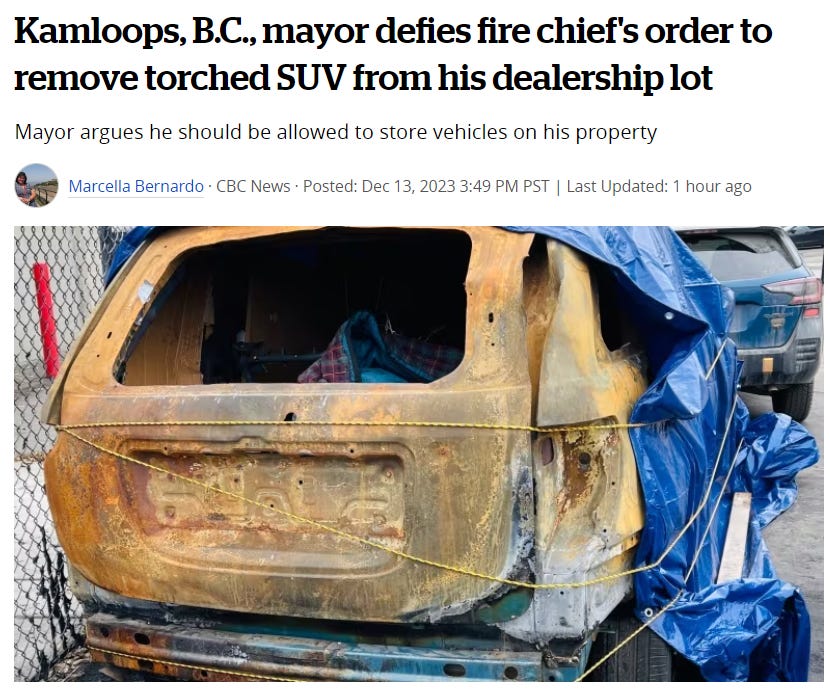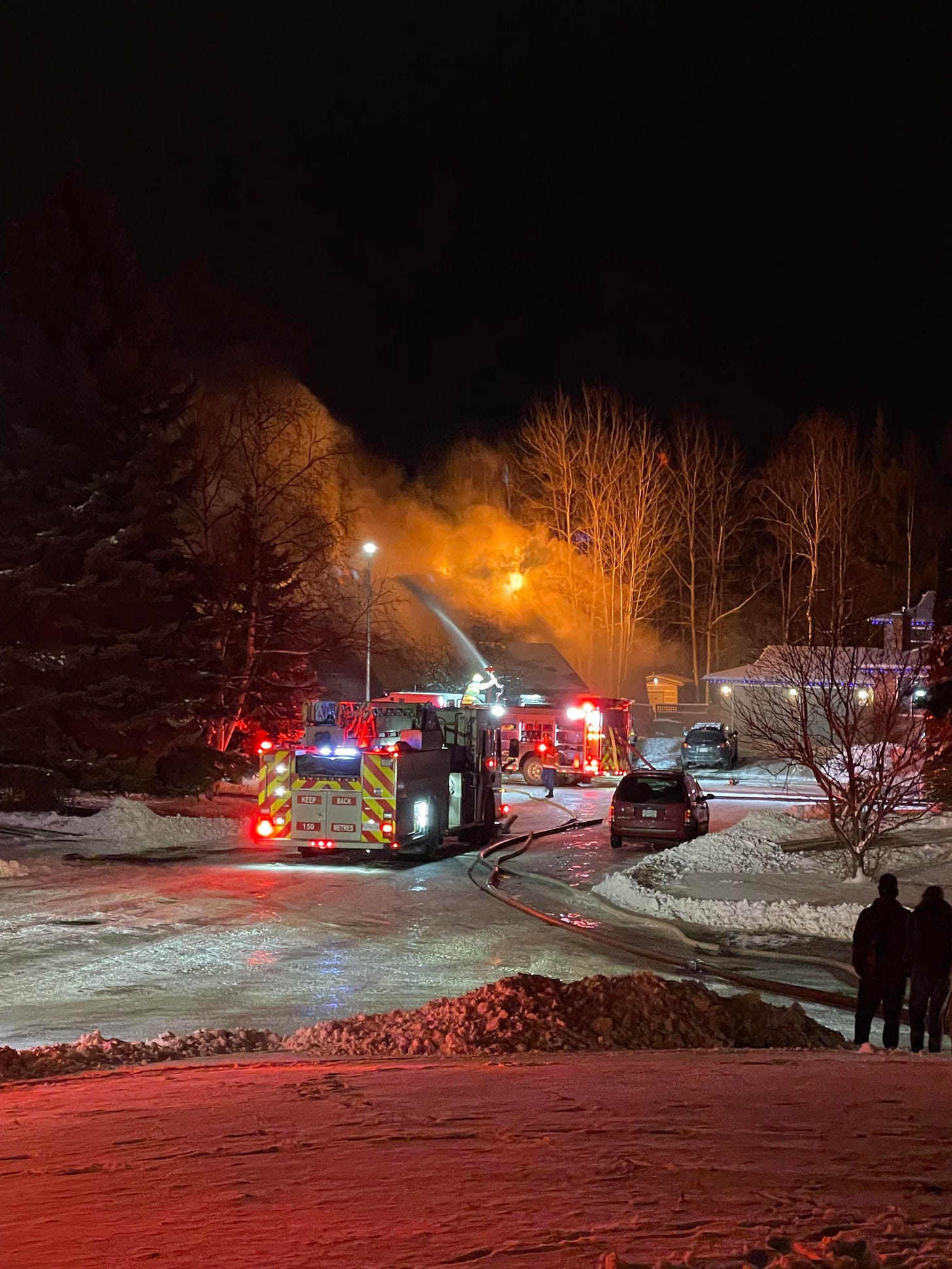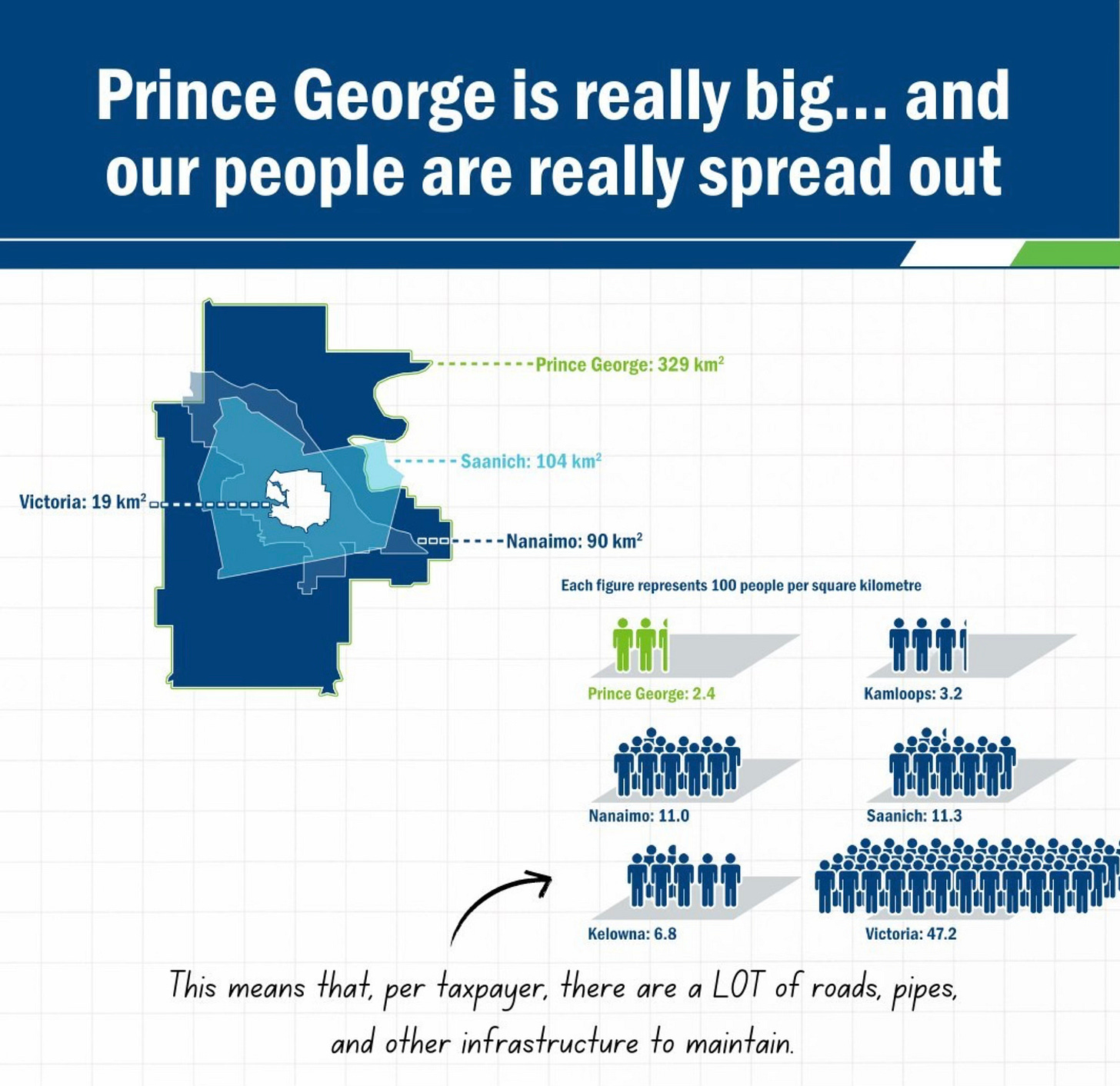Whose job is it to tell you whether charging taxpayers for a hotel stay 5 km from your home is in the public interest?
Whose job is it to tell you if a home explodes in your neighbourhood? Whose job is it to tell you the population is no longer growing exponentially?
Are you running out of time with your Christmas shopping? Sign someone up for this newsletter! Only if they would like it, though. Not as a mean joke.
Today in Northern Capital News, it’s time to play “Whose job is it?” Let’s meet today’s contestants:
Whose job is it to tell you whether charging a hotel stay 5 km from home to taxpayers is in the public interest?
A story about a politician spending money on flights, hotels and meals is a bit of a Rorschach test: If you’re inclined to thinking of them as hardworking individuals out there promoting important causes, you will see this as a necessary, important part of the job. If, on the other hand, you tend to think of them as fat cats getting rich off the public dime, you might be further outraged to learn that while you have to pay for your appies at the Keg using your own paycheque, the mayor is charging after-work snacks with co-workers to you, the taxpayer.
Such is the case with the report from Kate Partridge at CBC News that in his first ten months in office mayor Simon Yu racked up expenses of over $22,000, close to double what was budgeted and what his predecessor typically spent:
The documents show spending on trips to Vancouver, Montreal, Ottawa and Toronto, including a first-class stay in a deluxe suite in Ottawa.
There were more than $4,000 in meal expenses, primarily at restaurants in Prince George, all on the taxpayers' dime.
(For disclosure, I provided editorial feedback on this article and compiled the financial comparison to other cities.)
In the scheme of the municipal budget overall, $22,000 isn’t much — the impact on your tax bill would be well under a dollar. The bigger questions are around transparancy and judgement: Why is that money being spent, who is deciding it should get spent, and is it providing a return on investment? As one Reddit user said, “I’m more interested in the results of his travel to bring investment or tangible benefit to PG. I’m happy with a mayor’s travel/expense budget being 100k or any number as long as we’re getting higher return on that money,” and I also saw a comment saying that if all this travel resulted in just two full-time jobs, it would pay for itself.
So with that in mind, let’s zoom in on a couple of the more noteworthy items:
The trip to Ottawa
In June, Yu travelled to Ottawa to mark the 100th anniversary of Canada's Chinese Exclusion Act. There’s two parts to unpack about this trip: the hotel he stayed at, and why nobody knew about it.
First, the hotel: The receipt (which you can view for yourself, along with all the other expenses, in the article) is for $323 a night in a deluxe double room at the Fairmont Chateau Laurier. Asked about why he chose that particular option Yu said it was central to the meetings he was holding, which:
But there’s more: Yu said it was actually his executive assistant who made this decision. However, that’s not the case:
A follow-up email from the city's communications manager, Julie Rogers, shows Yu did, in fact, book his own stay at the Fairmont Château Laurier, and then forwarded the confirmation email to his executive assistant.’
Which brings us to point number two about this particular trip — why?
Generally speaking, when political leaders are representing their community at big national events because they feel it will benefit their consttiuents, they tell their constituents about it. There’s a press release or an Instagram post or something. As best I can tell, yesterday’s report was the first time Yu’s presence at this event had ever been reported. And when asked about this, he again pointed to city staff:
Yu said he believes it's the job of the City of Prince George's communications department to inform the public about his schedule.
"Perhaps at the time, the co-ordination of my activity was not synchronized yet with the [City of Prince George] communications team," said Yu.
"As a mayor, I'm not the type to try to blow my own horn … I leave this to my communications team if they feel that this event should be put on the city's website."
And again, this was disputed:
In an email to CBC News, Rogers said the mayor's calendar is shared with city council every two weeks, but not with the communications department. She says there are also many meetings and trips not added to his calendar.
Which is, in and of itself, somewhat noteworthy. What are these meetings about, and do we have the right to know? Also, what was accomplished for the city on this trip? That question was never answered. Which brings us to spending item number two:
The hotel stay in Prince George
In one instance, Yu charged taxpayers $242 for a one-night stay at the Prestige Treasure Cove Hotel in Prince George. Yu lives in the College Heights neighbourhood of Prince George, about five kilometres from the casino.
When asked about it, Yu said he made the calculated decision to stay at the hotel rather than cab home and then retrieve his car in the morning. Yu offered no explanation as to why he was unable to drive home following a business meeting with a potential investor from Amylia Capital Corp.
"At the time, I just did not know… [the rules around] the expenses and the limit."
In a written response, Yu says he now acknowledges that charging the city for that hotel stay was "not good practice" and he plans to pay back the $242 charge.
This lack of knowledge around the mayor’s job and how expenses work was repeated in his followup interviews at CKPG and the Citizen, as well: New to the job, Yu — a 64-year-old man who worked as the municipal manager for Rankin Inlet, had a career as an engineer, and helped raise six children — said no one had proactively alerted him to the fact that charging taxpayers for a hotel bill in your hometown might raise some questions. Except, here comes a blog post from councillor Cori Ramsay:
Who is responsible and accountable for our expenses? The answer is simple. We are. It’s not our staff. It’s surely not an executive assistant. It’s definitely not the city’s communications department. While they can support us in providing an update as to where we’re at if asked, the responsibility lies with individual council members – at least in my opinion which has been informed by five years of governance experience and orientation sessions.
All of council receives extensive orientation and training at the beginning of the term and we also receive additional information sessions throughout the year on things like the council remuneration bylaw, the council procedures bylaw, the community charter, the local government act, conflict of interest, and more. And there’s even conferences like the Local Government Leadership Academy (LGLA), NCLGA, and UBCM which add additional educational opportunities to learn about our role and ensure we are performing business in the interest of the public.
To a certain extent, it turns out that when you run for the top job in the city, you are responsible for yourself and need to use your own judgement.
Again, this is something of a Rorschach test. There was nothing illegal reported, nor is there an actual limit the mayor’s budget — just projected costs, based on past practices. Many, if not most, of the charges are what you might expect — trips to municipal meetings, with economy-class flights and standard conference-rate hotel fees. This exact same week Ken Sim, the mayor of Vancouver, made the case for increasing his travel budget based on the argument that in order to be a “world class city,” he needed to go to world-class places to attract world-class talent. Yu could argue the same. But if he does, he would also want to keep in mind another part of Sim’s statement, promising to share every lass invoice and saying, “People can judge where this money’s going and then we can show the results, and if we can’t get the results … [people] will hold me accountable.”
And, if we want to get some perspective from another first-term mayor about how things can go:
Whose job is it to tell you if a home explodes in your neighbourhood?
Tuesday night I was alerted to the fact that people in College Heights had heard a loud bang which was followed by a fire and flames. I was also sent photos of the aftermath:
I passed this on to the newsroom who put out calls to get more details and… nothing came back until yesterday morning when the city put out a release that there had been a fire, more than 12 hours after the fact, with no mention of the bang many people heard.
There was a time when media, and the public, had the ability to listen in to emergency channels used by first responders to communicate. When I started in a newsroom, lo in ye olden days of 2009, there was one on my co-workers desk which we used to monitor if a major event was happening and communicate it out. This ended in 2014 when police here switched to an encrypted channel, a move that was followed by first responders in the Lower Mainland in 2017. From an article reporting on that change:
However, not everyone is happy with the switch. Some worry the move will curtail the public's ability to monitor public emergencies.
…
One expert said previous moves to phase out analogue radios in other jurisdictions sparked questions about how the public will receive unfiltered information about these events.
"Typically what happens is the media start to ask how they will be notified of specific events," said Richard Frank, assistant professor at Simon Fraser University's criminology department.
"When other ... agencies in other parts of the world have switched over to digital, these questions always came up."
Without scanners, media outlets must rely on authorities to keep them abreast of public emergencies.
I think about this everytime an event like this happens and the information shared is slow, and minimal. I have more resources than most people to figure out things like why you felt your house shaking or there’s suddenly a bunch of sirens flying down your street, but the information I get is often late, incomplete or doesn’t come at all — nor do I have the energy to follow up on every single one. This is happening at the same time newsrooms are shrinking so there are fewer reporters with the ability to go out and see what the heck is going on — assuming anyone is even working at the time and they aren’t already tied up in a council or school board meeting. That leaves places like Facebook as basically the best/only source of information a bunch of the time, Tuesday night included, and yet you’ll often hear authorities telling people not to listen to Facebook and gossip but... what else is there?
Whose job is it to tell you the population is no longer growing exponentially?
Darrin Rigo’s newsletter returns with some thoughts on the city’s practice of blaming the tax-to-service ratio on the fact that Prince George was built with the expectation that it would be well in excess of 120,000 people by now and was constructed accordingly.
The population for Prince George in 1981 was 68,000. In 1991, it was 71,000. The population in 2001 was 74,000. Sure, the graph is going up marginally every decade but to say that our infrastructure problems are a result of decisions made around early population projections? Nope - I ain’t buyin’ it. We’ve had, at minimum, almost 50 years to begin to correct for that miscalculation.
To put it simply: Prince George’s sprawling is not a historic oopsy, it is an ongoing choice that, yes, has roots in legacy Prince George decision-makers but is being actively perpetrated by the current Mayor and Council and Administration.
Listen, I’m not going to recap the whole thing here, you should go read it at his newsletter. Also worthwhile is the Reddit dicussion around it which, among other things, points out that the evidence points to many people in the city actually liking — or at least, not disliking — sprawl.
Letters and posts
CC writes in response to the Chamber of Commerce supporting the city opting out of short-term rental legislation requiring people to live in homes they rent out on Airbnb and the like:
As someone who has yet to become a homeowner, it is incredibly disheartening to see the short term rental reaction. Young people want to settle down in Prince George but it’s impossible when all of the starter homes are being scooped up by people wanting to use them as Airbnbs. UNBC students are far less likely to want to stay in Prince George after graduating when housing is so unaffordable and there is very little chance of being able to afford to buy their own homes. The prioritizing of short term workers over long term residents is very questionable.
With the Airbnb ban, there will still be the MANY hotels in Prince George, as well as any airbnbs that are being run in the owner’s primary residence. There will not be a shortage of housing for temporary workers.
In related news:
Quick news:
In Monday’s newsletter, I took note of Mike Morris’ new website focused on forest conservancy as his apparent post-politics plan. He spoke to Rob Shaw in more depth about it.
I also got this letter from Mike Morris yesterday suggesting a train line from Prince George to Alaska be put in place. If not politics, I’d say he’ll have a place popping up with ideas on how things should be going.
Lheidli T’enneh First Nation in favour of proposed First Nations water bill.
Today’s song is “White Horse” by Chris Stapleton. It rocks in that old-school rock way.
Northern Capital News is a free, daily newsletter about life in Prince George. Please consider subscribing or, if you have, sharing with someone else.
Send feedback by replying to this email. Find me online at akurjata.ca.










The biggest red flag with Yu is how he so quickly threw his staff under the bus. Yikes.
First about media: It's disheartening to know that our media have become so hobbled, not only by citizen-turned-vigilantes (as in yesterday's note about the Hell Yeah post), but also by the actual tools required to do the job (access to scanners and other unfiltered information sources). I know Facebook isn't reliable, but for very current information it's invaluable.
Take accidents as an example. Commenters on community facebook pages may not know the why and the how of an accident, but often report that one has happened within minutes of it happening. People will often turn to media for the how the why, but unfortunately, that information rarely turns up. It's frustrating, and you're correct when you wonder what the options are.
And speaking of accidents, I'd be curious to know how many pedestrians have been hit in that area of the Hart over the past 3 years, 5 years, 10 years. Despite repeated calls for the province to step up with better lighting and actual sidewalks in that area, it hasn't changed much in the nearly 30 years I've lived in PG. The Frankfurt area has become a hub for precariously-housed and crime-involved people, and more often than not there is a warning on the Hart Community facebook page for drivers to be careful not to hit someone who is wandering on the road.
The Hart hwy is known for drivers and their speed. Yet in my experience, people often slow down to speed limit speeds in that area. People continually cross dangerously, walk in the road and wear all black clothing. Lighting is awful. And yes, people still speed up and down that highway. It's not up to me to say how and why all this happens. I have lots of ideas, though, as do the many commenters on the community facebook pages. Which gets me back to media, and the confluence of factors that make it difficult for media to do its job, and citizens to be well-informed.